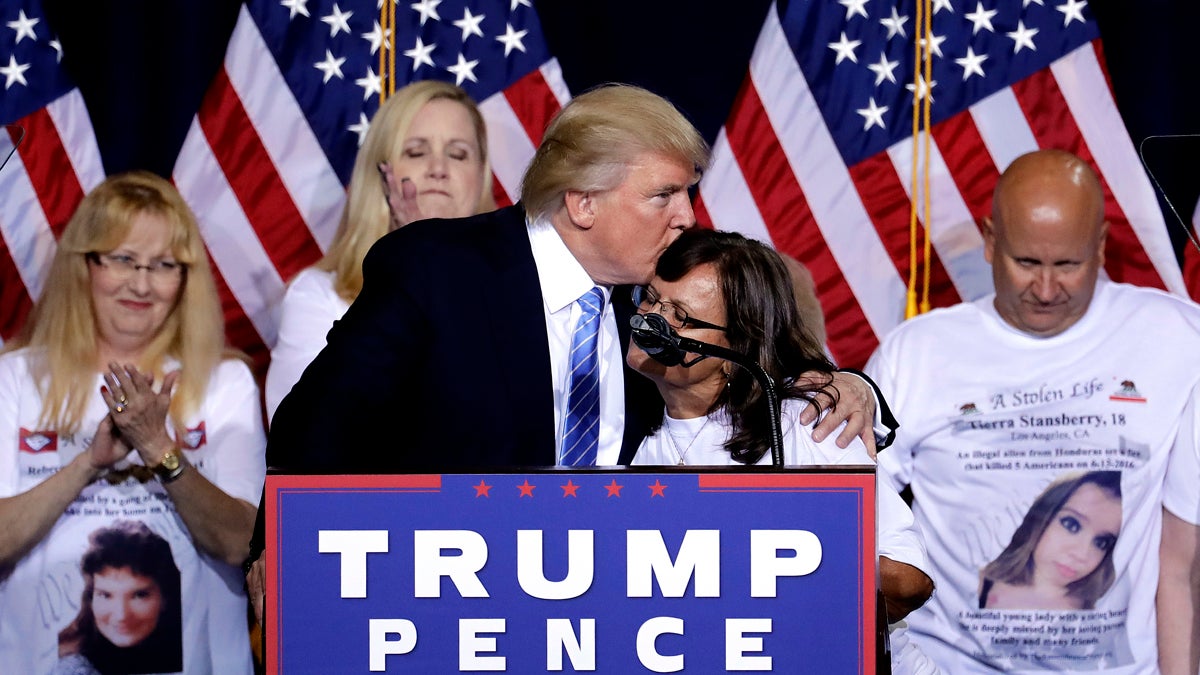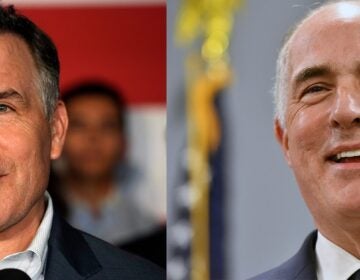Philly Latinos react to Trump’s immigration speech

Republican presidential candidate Donald Trump hugs a woman
Philadelphia’s Latino community listened to Trump outline how he’d handle immigration if he becomes President with a mixture of disbelief and disgust.
As Judith Bernstein-Baker listened to Donald Trump talk about immigration Wednesday night, she couldn’t help thinking about Theodore Bingham. Bingham was New York City’s police commissioner from 1906 to 1909. He caused an uproar when he blamed the city’s troubles on “foreign criminals,” and more specifically, Jews.
To Bernstein-Baker, that sounded suspiciously like Trump’s speech in Phoenix Wednesday night – only this time, the “foreign criminals” were Latino.
Trump renewed his pledge to build a wall “with above- and below-ground sensors” along the Mexican border, as well as drastically expand deportation efforts, to rid the United States of “illegal immigrants with criminal records a mile long.”
“My first hour in office, those people are gone!” Trump told his listeners, who responded with cheers.
Bernstein-Baker heads HIAS-Pennsylvania, a Philadelphia-based group that offers legal aid to immigrants and resettles refugees. Listening in from Philadelphia, Bernstein-Baker described Trump’s speech as “built on fear and aimed to inflame. It was a speech that didn’t really take into account the facts. He was talking not just about restricting undocumented immigrants; he was talking about restricting all immigration. But what does he think America is? America is an immigrant nation, and he wants to turn the clock back to 1950.”
She added: “Many of his proposals have already been tried and failed. Others would cost billions and billions of dollars. He’s just scapegoating immigrants for America’s problems. They’re easy to scapegoat because they don’t vote.”
Like Bernstein-Baker, others here active in Philadelphia’s Latino community listened to Trump outline how he’d handle immigration if he becomes President with a mixture of disbelief and disgust.
“The speech as a whole was fear-mongering; it was the most extreme version of fear-mongering and racism that I’ve heard in a very long time,” said Erika Almiron, executive director of Juntos, a South Philadelphia-based group led by the Latino immigrant community that advocates for human rights. “Fear-mongering is the basis for fascism and not policy.”
In Phoenix, Trump repeated many of the hard-line anti-immigration statements he’s made throughout his campaign, but he offered up a few more specific strategies, such as blocking federal funding for sanctuary cities, creating a new Immigration and Customs Enforcement (ICE) task force to find and deport undocumented citizens who commit crimes, hiring 5,000 more border-patrol agents and tripling the number of ICE deportation officers.
“We already spend more on immigration enforcement alone than the FBI, DEA and ATF combined, and he wants to spend more,” Bernstein-Baker marveled.
Miguel Andrade, a Juntos member and activist with the anti-deportation group #Not1More, worried that Trump’s speech could incite violence.
“History has always shown that whenever there is upheaval in a country, immigrants are scapegoated and made out to be the bad guys, the ‘boogeyman,’ the cause of all the strife,” Andrade said. “It’s horrible to hear somebody who could be the President of the United States demonize and criminalize an entire group of people, and it’s really important to think of the impact that rhetoric has. It’s not just words. It impacts how people think and act toward immigrant communities. That hateful speech gives people who already are xenophobic and racist license to act on it.”
Trump’s plans to expand ICE especially concerned Almiron.
“The last 15 years in this country have all been about the growth of Homeland Security, a growth designed to make our country afraid of ‘others,’” Almiron said. “ICE already is one of the most unaccountable agencies there is, and it’s an unaccountable agency that Trump is willing to throw more money at.”
Almiron pointed to the ICE-run Berks Family Residential Center in Leesport, one of just three facilities nationwide where authorities detain undocumented immigrants who are mothers and children. Some have been held there longer than a year, and began a hunger strike last month to protest their detention. Juntos has been lobbying the Obama administration to shut down such centers and look closer at Homeland Security and ICE spending and accountability.
Still, there could be one benefit from Trump’s talk, a local politician said: The slow simmer in the Latino community sparked by the GOP nominee’s past anti-immigrant comments exploded into a full boil after his Phoenix speech.
“People come out and vote when they’re angry,” said Philadelphia City Councilwoman Maria Quinones-Sanchez, who described Trump’s Phoenix speech as “surreal, like watching a movie.”
“It’s incumbent upon all of us to not only get factual information but also to come out and vote,” she added.
Adanjesus Marin, state director of Make the Road Action Pennsylvania, agreed: “The policies that they’re pushing demonize immigrants and create fear in our families. This won’t affect just immigrant families. All Latinos and people of color will be put into the position where they’ll have to ‘prove’ that they are in the country legally. Trump’s policies will federally codify racial profiling, allowing authorities to make subjective judgements and ask for papers based on appearance. Pennsylvania Latinos are more fired up than ever to knock on doors and prevent a Trump presidency by turning their communities across the state out to vote.”
WHYY is your source for fact-based, in-depth journalism and information. As a nonprofit organization, we rely on financial support from readers like you. Please give today.




